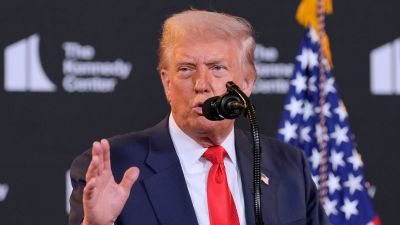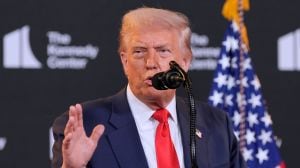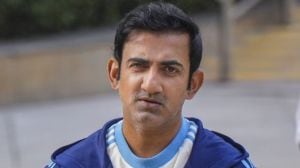Why is Trump friends with Brazil’s Bolsonaro? Explaining the US President as a model for the global right
Bolsonaro is ideologically aligned with Trump, and he has tried to consciously model himself after the US President. Trump is seen at the centre of a global resurgence of right-wing populism that is identifiable by economic nationalism, social conservatism, nativism, and protectionism.
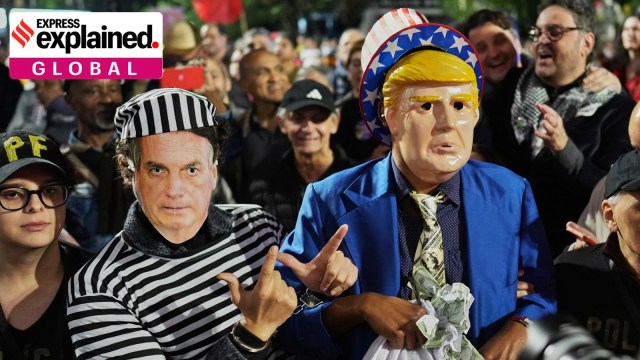 Protesters wearing masks of U.S. President Donald Trump, right, and former President of Brazil Jair Bolsonaro demonstrate after Trump's announcement of 50% tariffs on Brazilian goods, in Sao Paulo Thursday, July 10, 2025. (AP Photo/Andre Penner)
Protesters wearing masks of U.S. President Donald Trump, right, and former President of Brazil Jair Bolsonaro demonstrate after Trump's announcement of 50% tariffs on Brazilian goods, in Sao Paulo Thursday, July 10, 2025. (AP Photo/Andre Penner)US President Donald Trump has announced 50 per cent tariffs on imports from Brazil as punishment for an alleged “witch hunt” against his friend Jair Bolsonaro, the former far-right populist leader of the country.
The use of United States trade policy to influence the outcome of an ongoing criminal trial against a private individual in a sovereign foreign country is an unprecedented step by the Trump administration, which has repeatedly broken with conventional standards and practices of international diplomacy.
In a letter written to President Luiz Inácio Lula da Silva on July 9, Trump said the tariffs would be effective from August 1. “The way that Brazil has treated former President Bolsonaro, a Highly Respected Leader throughout the World during his Term, including by the United States, is an international disgrace,” Trump said.
Trump also claimed the US had a trade deficit with Brazil, and the 50% tariff was needed for “the Level Playing Field we must have with your Country”. In fact, the US has historically had a favourable trade balance with Brazil, with a surplus of $7.4 billion in a total trade of $92 billion in 2024.
President Lula decried Trump’s letter and announced countermeasures against the US. “Brazil is a sovereign country with independent institutions that will not accept being abused by anyone,” he said in a statement posted on X. The case against Bolsonaro is “exclusively under the jurisdiction of Brazil’s Judicial Branch and [is] not subject to any interference or threat”, he said.
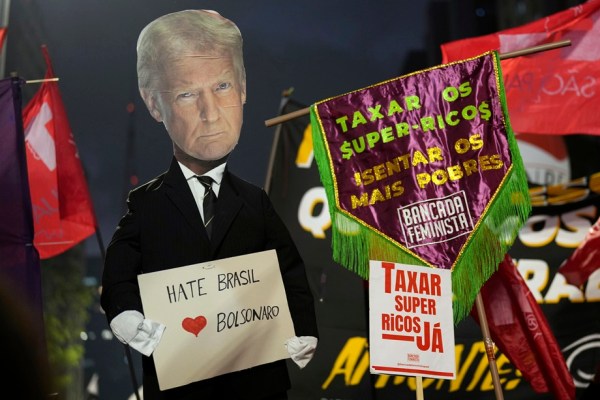 Protesters hold up an effigy of U.S. President Donald Trump in response to Trump’s announcement of 50% tariffs on Brazilian goods, in Sao Paulo, Thursday, July 10, 2025. (AP Photo/Andre Penner)
Protesters hold up an effigy of U.S. President Donald Trump in response to Trump’s announcement of 50% tariffs on Brazilian goods, in Sao Paulo, Thursday, July 10, 2025. (AP Photo/Andre Penner)
What is the ongoing case against Bolsonaro?
Bolsonaro is on trial for his alleged direct involvement in an attempted coup after he lost the 2022 presidential election to Lula.
Days after Bolsonaro left office in the beginning of January 2023, his supporters stormed government buildings in Brasilia and tried to get Brazil’s military to take power. Their actions were similar to those of the supporters of President Trump who rioted violently at the Capitol in Washington DC on January 6, 2021 following his defeat to Joe Biden in the 2020 presidential election.
A Brazilian court subsequently banned Bolsonaro from running for office until 2030, citing his continued attacks on the country’s electoral process. He was also charged in three separate criminal cases, one of which accused him of trying to overturn the result of the presidential election, and said he had “planned, acted in, and had direct and effective control over” an attempted coup.
Brazilian police have accused Bolsonaro of personally editing a decree to implement a national state of emergency in a bid to prevent Lula from entering office. In two reports adding up to 1,105 pages, the police have alleged that the plot involved assassination attempts on Lula, his running mate Geraldo Alckmin, and the crusading Brazilian judge Alexandre de Moraes.
What is the reason for Trump’s friendship with Bolsonaro?
In an interview given to The New York Times this January, Bolsonaro denied the coup plot but accepted accusations relating to the emergency decree. He then expressed hope that Trump would help him in his legal troubles.
This week, the American president compared the case against Bolsonaro with the criminal charges he faced after the 2021 insurrection, and called it a “WITCH HUNT”.
“It happened to me, times 10,” he wrote on social media on July 7. “I’ll be watching the WITCH HUNT of Jair Bolsonaro, his family, and thousands of his supporters, very closely.”
Bolsonaro, a former army captain, has previously described Brazil’s 21-year military dictatorship (1964-85) as a “very good period”, attacked homosexuality, spoken disparagingly against women and children, and dismissed criticism of his far right views as “political correctness”.
His victory in the presidential election of 2018 was seen as a triumph of conservative populism, with voters expressing their frustration with the economic policies of the leftist Workers’ Party to which Lula belongs.
Bolsonaro has been seen as ideologically aligned with Trump. Half of his time in office coincided with Trump’s first term in the White House (2017-21), during which he broke with the historical Brazilian mistrust of the US.
What likely endeared Bolsonaro to Trump in his first term was his enthusiastic endorsement and amplification of the US President’s complaints against “fake news”.
In March 2019, Bolsonaro pledged a joint commitment by the US and Brazil to “to ensure liberties and respect to traditional family lifestyles, respect to God our creator against the gender ideology or the politically correct attitudes, and against fake news”. Trump later said that he was “very proud to hear the President use the term ‘fake news’”.
In the following years, Bolsonaro’s conscious attempts to model himself on the US President earned him the moniker of “Trump of the tropics”. Commentators have seen the friendship between the two men as being built on mutual respect, and a shared disdain for legacy media and scepticism about science and scientists.
Both leaders have been implicated in legal cases, and have accused their political rivals of targeting them unfairly. And most significantly, both have responded to electoral defeats in similar fashion – alleging electoral fraud, refusing to concede the presidency, and instigating insurrections.
Is this attempt to role-model Trump unique to Bolsonaro?
Over the years, leaders in several countries have sought to emulate Trump’s brand of anti-establishmentarianism with varying degrees of success. The US President is today seen at the centre of a global resurgence of right-wing populism that is identifiable by economic nationalism, social conservatism, nativism, and protectionism.
Trump’s own approach to governance is seen to have a precedent in the model adopted by Hungary’s Prime Minister Viktor Orban. ‘Project 2025’, the conservative policy wishlist circulated by Trump’s supporters, was modelled on a similar effort by Orban’s Fidesz party after he became Prime Minister in 2010.
Alice Weidel of the Alternative for Germany (AfD), has benefited from Trump’s endorsement of the far right German party, which made significant gains in elections held last year. Elon Musk, a staunch Trump ally at the time, and US Vice President J D Vance had backed the AfD strongly.
In Latin America, Argentina’s President Javier Milei and El Salvador’s President Nayib Bukele have presented themselves as Trump’s allies.
Milei, a libertarian economist and “anarcho-capitalist”, benefited politically from comparisons to Trump, and his promise to abolish “political caste” in the country. Bukele claims to not have any political affiliations, but critics see his support for Trump’s crackdown on immigration as emboldening him to pursue increasingly authoritarian policies in his country.
However, the ‘Trump Effect’ has notably backfired on some leaders.
Pierre Poilievre, leader of Canada’s Conservative Party who had styled himself as his country’s Trump, pushing a “Canada First” agenda that critiqued open borders and the disastrous economic policy of former Prime Minister Justin Trudeau, lost an election he had been expected to win until a few months before the vote following the US tariffs against Canada and the President’s repeated threats to make the country America’s “51st state”.
Something similar was witnessed in Australia’s federal election, in which the conservative Coalition Party led by “Temu Trump” Peter Dutton, lost to the Labor Party of Prime Minister Anthony Albanese. Dutton, like the US President, criticised “woke” politics, Australia’s immigration policy, and the country’s national broadcaster, and threatened to slash 41,000 public sector jobs.
Photos


- 01
- 02
- 03
- 04
- 05

